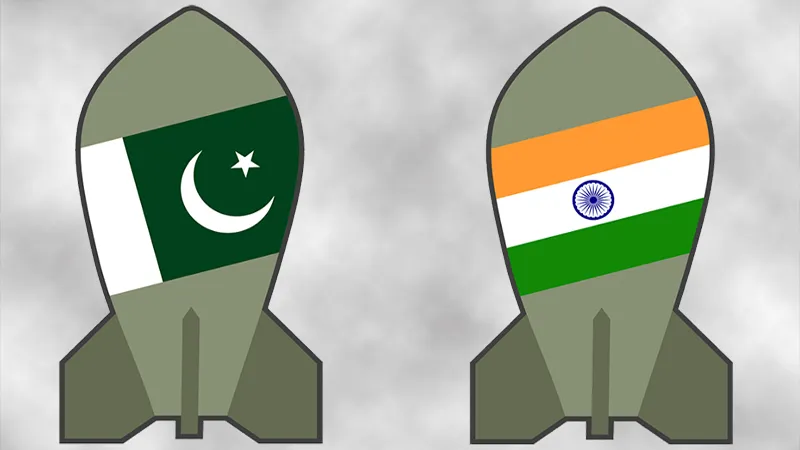-
CENTRES
Progammes & Centres
Location
India’s decision to revoke Article 370 giving special status to Jammu & Kashmir has put Pakistan on the back foot, dealt New Delhi back into the South Asia equation and created a few difficulties for the United States.

India’s decision to revoke Article 370 giving special status to Jammu & Kashmir has put Pakistan on the back foot, dealt New Delhi back into the South Asia equation and created a few difficulties for the United States.
Without going into the morality and legality of New Delhi’s move, which deserve a separate iteration, it can’t be denied that geo-politics in the region changed dramatically this week.
Islamabad’s anti-India rhetoric says it all – Pakistan has gone into its rail-and-flail mode. The noise is deafening as it is worrisome but it will get Pakistan some extra American attention.
The carefully structured Afghanistan peace process suddenly doesn’t look as stable because Pakistan does not have the bandwidth to both punish India and deliver for the United States. If it starts a military adventure, the whole apple cart falls.
An unhinged Pakistan is hardly helpful to President Donald Trump. His accelerated plans to bring US troops home in time for his re-election campaign may fall apart if Pakistan decides to go rogue now.
But then Pakistan’s generals didn’t expect India to go for it, not yet at least. Just as the Pakistani establishment was enjoying the benefits of Prime Minister Imran Khan’s US visit and celebrating Trump’s offer to mediate in the Kashmir dispute, the ground shifted from under its feet.
US diplomatic intervention on Kashmir was one of the demands of Pakistan’s civil-military leadership in exchange for help in the Afghanistan peace process. Trump delivered but his over enthusiasm for a Nobel Peace Prize may have backfired.
India not only pushed back hard, it went further than Khan and his army chief Gen. Qamar Bajwa might have anticipated. As many have said, New Delhi took Trump’s decision to get out of Afghanistan seriously and set in motion a series of decisions to insulate India from the fallout of a Paksitan-Taliban-dominated Afghanistan.
Revocation of Article 370 and making J&K a union territory means it is now merged with the Indian union and will come under laws applicable to the rest of India. The move removes the main argument of Pakistani desire for international intervention, a desire that both the British and the Americans have nurtured for their own advantage at different times.
Since Pakistan is now without a strategy to counter India’s move, it will use old tricks – bluster, threats and a dash of nuclear blackmail. Khan has already downgraded relations with India, stopped whatever meager trade there is and talked ominously about suicide bombings.
His ambassador to the United Nations will plead with Security Council members to raise the issue. Success is unlikely because Pakistan has failed to get any traction in New York for the Kashmir “issue” for some years now. There may be a modicum of success at OIC.
The “naya” Pakistan reportedly has no space for terrorist groups and terror financing.
Meanwhile, hardliners on Twitter are demanding freedom for Hafiz Saeed and his immediate deployment in the service of Pakistan.
Can Pakistan indulge its jihadi habit again after Khan spoke so eloquently about the “new Pakistan” during his Washington visit last month? The “naya” Pakistan reportedly has no space for terrorist groups and terror financing. Besides, Pakistan has promises to keep vis-à-vis the Financial Action Task Force to get off the “grey list.”
It’s another matter that US officials, who just last week talked emphatically about a FATF “action plan” for Pakistan with “measurable” results, may look the other way as Pakistan sends terrorists across or instigates violence in J&K. If it’s in US interest to protect Pakistan because of the Afghan peace process, it will do so and India should be prepared for that.
But there’s no denying that Pakistan is in a bind with no good answers. Over the last two days, its efforts are geared towards getting the Trump Administration to say something, anything. The State Department issued a somewhat balanced statement on Monday, even noting India’s insistence that the scrapping of Article 370 was an internal matter. It made the Pakistanis deeply unhappy.
Reports from New Delhi suggested that the US might have been apprised of India’s moves. India’s foreign minister S. Jaishankar reportedly had hinted at the impending change in J&K’s status when he met his US counterpart Mike Pompeo in Bangkok. This made Pakistan even more unhappy. If the Americans knew about it, why didn’t they tell Islamabad or better still, do something.
By Wednesday, the White House was busy trying to save what gains were made during Khan’s visit. A second statement insisted the US knew nothing about Indian actions and “the Indian government did not consult or inform the U.S. government before moving to revoke” Article 370.
It went on to note the “history of violence and conflict in the region” and urged dialogue between India and Pakistan, trying to calm Pakistani nerves.
The US and Britain are somewhere in the middle, raising some concerns but not as strongly as Pakistan would have hoped.
In this game of statements, it’s best not to get too worked up. They are designed to please or berate depending on the situation. Still it must irk Pakistan that Sri Lanka and the Maldives have supported India. The United Arab Emirates said India’s decision was aimed at “improving efficiency” and reducing regional disparity.
Russia and France have said nothing thus far. The US and Britain are somewhere in the middle, raising some concerns but not as strongly as Pakistan would have hoped. The only country firmly in Islamabad’s corner is China and that’s for obvious reasons – it occupies a part of the J&K and sees its own game getting more complicated.
But it’s good to remember that international understanding does not last forever and it’s imperative that New Delhi begin the healing because in the end real peace will prevail in J&K when there is reconciliation with all the people.
The views expressed above belong to the author(s). ORF research and analyses now available on Telegram! Click here to access our curated content — blogs, longforms and interviews.

Seema Sirohi is a columnist based in Washington DC. She writes on US foreign policy in relation to South Asia. Seema has worked with several ...
Read More +